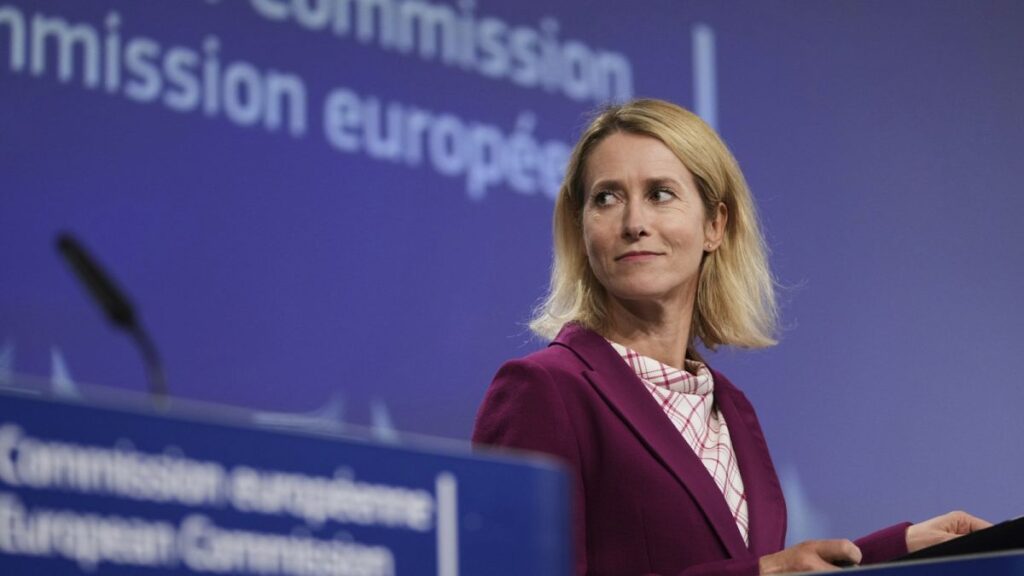The European Commission has issued a package of proposals aimed at sanctioning Israel for its ongoing military assault in Gaza, as well as deepening occupation of the West Bank, which Brussels says breach the EU-Israel Association Agreement.
The measures also include sanctions on ten members of the Hamas terrorist organisation and two “extremist” ministers in the Israeli government, Security Minister, Itamar Ben Gvir and Finance Minister, Bezalel Smotrich for their role inciting violence in the West Bank.
The decision to act against the Jewish state is based on “the rapidly deteriorating humanitarian situation in Gaza following the military intervention of Israel, the blockade of humanitarian aid, the intensifying of military operations”, including the ongoing ground offensive, according to the European Commission.
It also relates to the “decision of the Israeli authorities to advance the settlement plan”, according to the executive arm of the EU.
European Commission President Ursula von der Leyen already flagged the plan to use EU-wide measures to pressure Israel during her State of the Union address last week.
“The horrific events taking place in Gaza on a daily basis must stop. There needs to be an immediate ceasefire, unrestrained access for all humanitarian aid, and the release of all hostages held by Hamas,” she said.
“We propose to suspend trade concessions with Israel, sanction extremist ministers and violent settlers, and put bilateral support to Israel on hold, without affecting our work with Israeli civil society or Yad Vashem Holocaust memorial,” she then said.
The EU will also suspend preferential trade in the Israel – EU Association Agreement, meaning, duties on certain goods exempted through the agreement will now apply.
The EU is Israel’s largest trading partner, accounting for 32% of Israel’s total trade in goods with the world in 2024. Israel is the EU’s 31st largest trading partner.
Around 37% of goods traded between Israel and Europe are duty free as part of preferential trade agreement and it is this part which will be suspended if EU member states agree to support the proposal.
It’s estimated Israel will pay €227 million per year more in duties after the suspension of preferential trade agreement.
Proposal is necessary and proportionate, says EU Trade Commissioner
“The aim is not to punish Israel” but to alleviate the suffering in Gaza, said EU Foreign Policy chief, Kaja Kallas.
“We are trying to pressure the Israeli government to change course,” she said.
Trade in goods between the EU and Israel in 2024 was worth €42.6 billion. EU imports from Israel were worth €15.9 billion.
In addition, the EU will sanction violent settlers and several settler organisations in the West Bank.
“We regret having to take this step”, said EU Trade Commission Maros Sefcovic, but he said the EU saw “no alternative given the humanitarian situation in Gaza”.
It is “necessary” and “proportionate”, he said.
Commissioner Sefcovic said Commission president Ursula von der Leyen went to Israel after the 7 October 2023 terrorist attack where she shared the “shock and horror” of the Hamas terror attack in Kibbutz communities in Israel.
But he said: “Now is the time we must work together to end the humanitarian crisis in Gaza.”
He called for an “urgent ceasefire to stop the bloodshed”.
“Israelis need security”, and “Palestinian people need real dignity”, said Sefcovic.
The Israel government has slammed the proposals and vowed not to change any policy related to Gaza or the West Bank.
Israeli Foreign Minister Gideon Saar accused von der Leyen of “empowering” Hamas.
Saar wrote to von der Leyen saying the action under the EU-Israel Association Agreement was “replete with false accusations and legal flaws”.
However, the EU has rejected this saying the process was within EU’s legal rules and regulations.
“This is about our own internal decision making. We are following the rules of trade, so it’s not up for any country to comment our decision making – we are following our own rules,” an EU official said.
EU member states are now required to vote on the proposals requiring a qualified majority to pass.
So far, all other prospective policies aimed at sanctioning Israel for its war in Gaza and further occupation of the West Bank have been routinely voted down by several member states including Italy, Germany, Austria, Czech Republic, Hungary and Bulgaria.
If either of the two largest countries – Italy or Germany – support the plan, then it’ll pass. However, both governments have been steadfast in their opposition to taking any action in response to Israel’s actions in Gaza and the West Bank.
There is no indication these positions have evolved.
“The political lines are very much in the place where they have been so far,” said EU Foreign policy chief Kaja Kallas.
But she told reporters on Wednesday that “public opinion is shifting in member states and people want to see the suffering stop”.
Read the full article here
